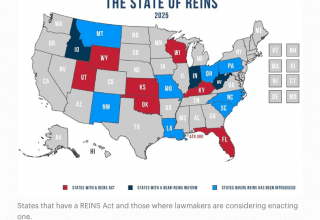The North Carolina Senate approved a major piece of regulatory reform legislation Tuesday, advancing House Bill 402—titled the “REINS Act” or “Limit Rules with Substantial Financial Costs”—with a 26-17 vote. The measure marks a significant effort by Republican lawmakers to impose new checks on unelected regulatory bodies and to curb the economic burden of expansive government rulemaking. It now goes back to the North Carolina House for consideration.
Key Provisions of the REINS Act
House Bill 402 targets what supporters call “regulatory overreach” by requiring greater legislative scrutiny for rules that impose high financial costs. The legislation introduces tiered thresholds for regulatory oversight:
- Any proposed permanent rule with an economic cost of $20 million or more over five years must receive direct approval from the General Assembly, unless the rule is mandated by federal law.
- Rules that would cost more than $10 million over five years would need unanimous approval by the rulemaking board or commission, again unless federally required.
- Rules exceeding $1 million over five years would require a two-thirds supermajority vote from the adopting body.
Importantly, the bill expands the definition of “substantial economic impact” from $1 million over a 12-month span to $1 million over five years. That change is expected to significantly widen the range of regulations subject to stricter scrutiny and comprehensive fiscal note requirements.
Supporters: Transparency and Accountability
Republican leaders argue the bill will enhance government accountability and protect North Carolina residents and businesses from overregulation. They say that unelected bureaucrats have too much power to impose costly rules without sufficient input from elected officials or consideration of long-term financial consequences.
“This is a straightforward, commonsense bill ensuring that costly rules implemented by unelected bureaucrats get a second look from the General Assembly,” Senate Leader Phil Berger, R-Rockingham, said in a press release issued after passage Tuesday.
Backers also emphasize the bill’s emphasis on transparency, noting that the expanded fiscal note process will offer stakeholders — including businesses, local governments, and citizens — a clearer understanding of the economic consequences of proposed regulations before they are implemented.
“We have dozens of boards and commissions that have broad rulemaking authority in our state,” Sen. Steve Jarvis, R-Davidson, said. “Those rules have significant impacts on the daily lives of North Carolinians, and it’s important to have an avenue to hold these boards accountable and bring much-needed transparency to the rulemaking process. That’s why this bill is vital.”
Critics: Risks of Legislative Bottlenecks
Opponents of the REINS Act warn that the legislation could stifle timely responses by regulatory agencies, particularly in areas such as environmental protection, public health, and worker safety. By requiring legislative approval or supermajority board votes, critics say the bill could lead to bureaucratic delays and partisan gridlock.
Some also raise concerns that the thresholds set in the bill could discourage agencies from proposing rules if the cost projections—regardless of net benefit—appear politically risky or burdensome to defend.
Broader Implications
The REINS Act places North Carolina among a growing number of states adopting measures modeled after the federal-level Regulations from the Executive in Need of Scrutiny Act. Seven states have passed such laws so far, with Kentucky and Utah most recently passing them in 2025.
North Carolina’s HB 402 reflects a broader movement to rein in executive agency power at the state level. Americans for Tax Reform estimates that more than a quarter of US states will have a REINS Act on the books by 2026.
“Unelected bureaucrats shouldn’t make million-dollar rules in the dark,” said Donald Bryson, CEO of the John Locke Foundation. “The REINS Act brings democracy back to rulemaking by requiring costly regulations to get approval from elected lawmakers, accountable to voters. If it impacts your wallet, your vote should matter.”
REINS is one of the most transformational pieces of policy that NC can pass. It puts power back in the hands of our elected representatives, where they can be held accountable. 80% of NCians think these rules should be passed through the legislature, not unelected officials. It’s…
— Tyler Voigt (@TylerJVoigt) June 10, 2025
What’s Next
With Senate approval secured, House Bill 402 now returns to the North Carolina House of Representatives for concurrence on amendments made in the Senate. If the House agrees to the changes, the bill will be sent to Gov. Josh Stein.
The post NC Senate passes REINS Act to address costly regulations, boost oversight first appeared on Carolina Journal.
The post NC Senate passes REINS Act to address costly regulations, boost oversight appeared first on First In Freedom Daily.
Click this link for the original source of this article.
Author: CJ Staff
This content is courtesy of, and owned and copyrighted by, https://firstinfreedomdaily.com and its author. This content is made available by use of the public RSS feed offered by the host site and is used for educational purposes only. If you are the author or represent the host site and would like this content removed now and in the future, please contact USSANews.com using the email address in the Contact page found in the website menu.








